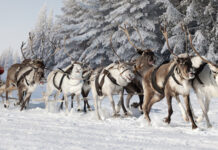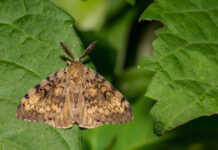 The Asian Longhorned Beetle (ALB), an invasive insect that kills 12 types of hardwood trees in North America, is currently in four states: Massachusetts, New York, Ohio, and South Carolina. If you work in a quarantine area, you must follow state and federal laws that restrict the movement of woody material and untreated firewood.
The Asian Longhorned Beetle (ALB), an invasive insect that kills 12 types of hardwood trees in North America, is currently in four states: Massachusetts, New York, Ohio, and South Carolina. If you work in a quarantine area, you must follow state and federal laws that restrict the movement of woody material and untreated firewood.

Federal and State officials work closely with the U.S. Department of Agriculture (USDA) to eradicate ALB using a combined approach including imposing quarantines, conducting tree inspections, removing infested trees (and sometimes high-risk host trees), using systemic insecticides when appropriate, researching best practices and new eradication methods, and involving and informing residents. Eradication efforts have eliminated infestations in Illinois and New Jersey.
The following provides information about current infestations from USDA APHIS.
SOUTH CAROLINA – First detection: May 2020
- Regulated Area: 76.4 sq. miles in Charleston/Dorchester Counties
- Infested Trees: 8,374 (64 in Charleston; 5,140 in Hollywood; 1,871 on Johns Island; and 1,298 in Ravenel)
- Removals: approx. 8,305 (4,954 Infested; 3,351 High-Risk Hosts)
- Surveys: 276,999
Regulated yard waste can be disposed at Bees Ferry Road Convenience Center, 1344 Bees Ferry Road, 29414, or Hollywood Convenience Center, 5305 Highway 165, 29449. For more information, click South Carolina.

APHIS and/or State partners contract with licensed tree removal specialists to perform the tree removal work under supervision by APHIS or a partnering State official. In South Carolina, the removal contractor is Davey Resource Group. Free compliance training is available for businesses and individuals who perform work that may involve moving wood materials in the quarantined area. To register for an ALB compliance training in South Carolina, call 843-973-8329.
OHIO – First detection: June 2011
- Regulated Area: 49 sq. miles* in Clermont County, Tate and Williamsburg Townships
- Infested Trees: 21,762 (34 in East Fork Recreational Area; 48 in Monroe Township; 21,677 in Tate Township; and 3 in Stonelick/Batavia Township)
- Removals: 117,584 (21,729 Infested; 95,855 High-Risk Hosts)
- Surveys: 4,389,354
The wood disposal yard is located at 2896 State Route 232 in Bethel. For more information, click Ohio.
APHIS and/or our State partners contract with licensed tree removal specialists to perform the tree removal work under supervision by APHIS or a partnering State official. In Ohio, the removal contractor is Beach’s Trees Selective Harvesting. Free compliance training is available for businesses and individuals who perform work that may involve moving wood materials in the regulated area. To register for an ALB compliance training in Ohio, call 513-381-7180.
* Monroe Township was eradicated in September 2018, resulting in a reduction of the regulated area by .5 sq. miles. Stonelick and Batavia Townships were eradicated in March 2018, resulting in a reduction of the regulated area by 5 sq. miles.
MASSACHUSETTS – First detection: August 2008
- Regulated Area: 110 sq. miles* in Worcester County
- Infested Trees: Approx. 24,209 (1 in Auburn; 6 in Boston; 1,413 in Boylston; 233 in Holden; 1,097 in Shrewsbury; 699 in West Boylston; and 20,760 in Worcester.)
- Removals: Approx. 36,265 24,209 Infested, 12,056 High-Risk Hosts
- Surveys: Inspections continue
- The wood disposal yard is located at Dr. Paul Ware Drive in Boylston. For more information, or click Massachusetts.
All landscapers or landscape businesses performing work in the regulated area are required to comply with certain regulations. Companies doing pruning or removals, or in any way handling wood from ALB host trees within the regulated area must have a valid compliance agreement. Free compliance training is available and may be obtained by attending a 45 minute training session. Please be advised that Regulatory Officers conduct surveillance within the regulated area to enforce the quarantine, and fines may be assessed if businesses do not comply with Federal and State regulations. Training is held the second Wednesday of each month at 5:00 p.m. and the second Thursday of each month at 8:30 a.m. To register for an ALB compliance training in Massachusetts, please call (508) 852-8110 or email ALBWorcester@aphis.usda.gov.
* Boston (Suffolk County) declared eradication in 2014, resulting in a reduction of the regulated area by 10 sq. miles.
NEW YORK – First detection: August 1996
- Regulated Area: 53 sq. miles* in Nassau/Suffolk County
- Infested Trees: 7,252 (2,900 in Amityville; 2,327 in Brooklyn; 27 in Islip; 110 in Manhattan, 1,831 in Queens; and 57 on Staten Island.
- Removals: 24,116 (7,244 Infested; 16,872 High-Risk Hosts)
- Surveys: Inspections continue
For more information, please call 866-265-0301 or click New York. APHIS and/or our State partners contract with licensed tree removal specialists to perform the tree removal work under supervision by APHIS or a partnering State official. In New York, the removal contractor is Integrity Tree Care.
Regulated material may not be removed from quarantine areas unless accompanied by a Limited Permit or Certificate authorizing such movement. Anyone handling ALB regulated material who wishes to obtain an AGM Compliance Agreement, enabling the movement of wood for purposes of disposal, may do so by contacting AGM. Free compliance trainings are offered by the New York State Department of Agriculture and Markets and are available for any businesses or individuals engaged in activities requiring the proper handling, movement, and disposal of regulated articles that are harvested within the ALB regulated areas. For more information about ALB compliance training in New York, call 631-288-1751.
* Brooklyn and Queens were eradicated in 2019, resulting in a reduction of the regulated area by 58 sq. miles. A new infestation detected in the Amityville area in 2013 resulted in an increase of the regulated area by 28 sq. miles. Manhattan (New York County) and Staten Island (Richmond County) were eradicated in 2013, resulting in a reduction of the regulated area by 26 sq. miles. Islip (Suffolk County) was eradicated in 2011, resulting in a reduction of the regulated area by 7 sq. miles.
Ongoing Research
USDA laboratories conduct research to learn more about the beetle. This information guides the approach used to fight infestations. Field studies, trials, and laboratory research over the years have been vital in developing the protocols used today to fight the beetle.
Current research includes regulatory treatments for wood and nursery stock, chip size and grinding techniques to deregulate host materials, traps to lure adult beetles, and the use of dogs to detect the insect’s presence. USDA is also studying how the insect spreads on its own and its host tree preference and range and conducting DNA analysis and various behavioral experiments.
To learn more about the ALB, including ID, tree damage, and treatments, read:
August Declared “Tree Check Month” For Asian Longhorned Beetle











![[VIDEO] Dickies®: Discover Workwear That’s Anything But Uniform](https://turfmagazine.com/wp-content/uploads/2023/06/1647663814-4b1a2a7742790a9b1e97a3b963477850192e1d6a9dfba9b07214a77bae25d6e3-d-218x150.jpg)






























![[VIDEO] Dickies®: Discover Workwear That’s Anything But Uniform](https://turfmagazine.com/wp-content/uploads/2023/06/1647663814-4b1a2a7742790a9b1e97a3b963477850192e1d6a9dfba9b07214a77bae25d6e3-d-324x160.jpg)